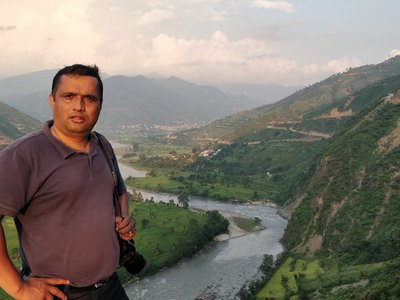

Basanta Raj Adhikari, received his Ph.D. in Earth Sciences from the Faculty of Earth Sciences, Geography and Astronomy, University of Vienna, Austria in 2009. Dr Adhikari is currently working as the Director of the Centre for Disaster Studies, Institute of Engineering, Tribhuvan University, Nepal. He is also a Senior Foreign Associate Professor at the Institute for Disaster Management and Reconstruction, Sichuan University, China, a Visiting Professor at Keio University, Japan, and a Senior Research Fellow at the University of Melbourne, Australia. His main research interests are Himalayan tectonics, climate change, hillslope movement and human interaction, Himalayan sediment flux generation, landslide early warning, multi-hazard risk assessment, community-based disaster risk reduction and nature-based solutions. With over 60 scientific papers and book chapters to his credit, he has been recognised for his contributions in the field of earth sciences. Dr Adhikari has received awards such as "Young Affiliates" (The World Academy of Sciences), "Sichuan 1000 Talents" and "Young Scientist" (Integrated Research on Disaster Risk). He actively contributes to disaster risk reduction policy documents at national and international levels.
Recently, Dr Adhikari co-edited a book titled "Geomorphic Risk Reduction Using Geospatial Methods and tools" with Prof. Raju Sarkar, Dr Sunil Saha and Prof. Rajib Shaw. This publication is part of a book series on "Disaster Risk Reduction: Methods, Approaches and Practices", which aims to promote the results of action research on disaster risk reduction that will be useful to a wide range of stakeholders, including academics, professionals, practitioners and students and researchers in related fields. The series focuses on emerging needs in the field of risk reduction, starting with climate change adaptation, urban ecosystems, coastal risk reduction, education for sustainable development, community-based practices, risk communication and human security, among others. This book explores the use of advanced geospatial techniques in geomorphic hazard modelling and risk reduction. It also compares the accuracy of traditional statistical methods and advanced machine learning methods, and considers the different ways in which the impact of geomorphic hazards can be reduced.
Dr. Basanta Raj Adhikari received the North-South Dialogue scholarship (financed by the Austrian Development Cooperation) for his PhD at the University of Vienna. This invaluable opportunity has not only facilitated global connections, but also fostered a tapestry of collaboration and exchange in Austria. Engaging in dialogue with esteemed scholars from diverse backgrounds has ignited a fresh perspective within him, nurturing both creativity and logical thinking. Interacting with peers from around the world has not only broadened his academic horizons but has also enriched his understanding of cultural diversity, as evidenced by the myriad of experiences shared during cultural exchanges among friends. The profound impact of the Austrian education system has resonated deeply with him, inspiring a commitment to emulate its ethos of excellence in both my academic and professional pursuits. As he continues to navigate his academic journey, he is deeply grateful for the transformative experiences enabled by the scholarship and enduring influence of his time spent in Austria.
